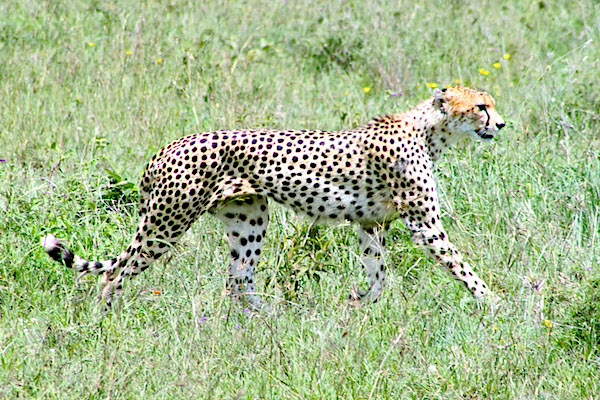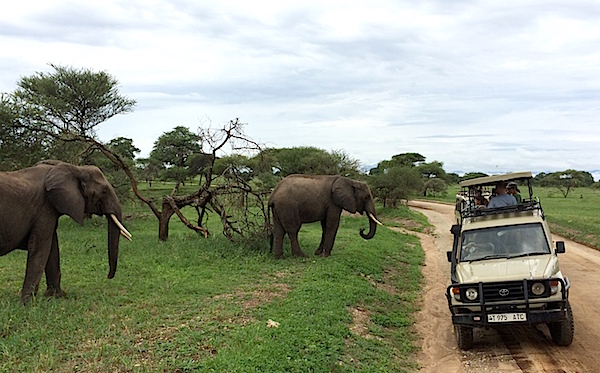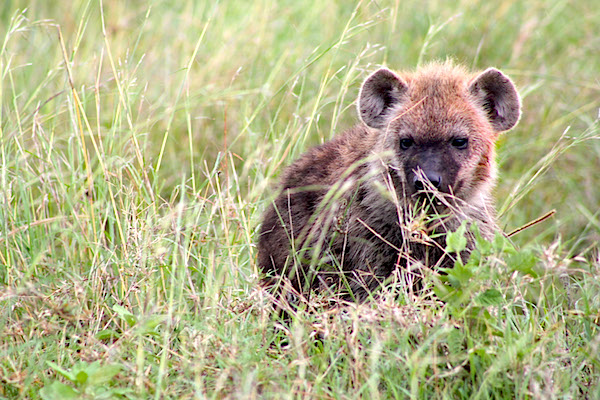 Safaris in national parks in Africa can lead to close encounters with wildlife, such as this cheeta/Sean Smith
Safaris in national parks in Africa can lead to close encounters with wildlife, such as this cheeta/Sean SmithEditor's note: Sean Smith is a former Yellowstone National Park ranger, and an award-winning conservationist, TEDx speaker, and author. He recently had the opportunity to visit some national parks in Tanzania, and returned home with thoughts of what the National Park Service might learn from its African colleagues.
I recently returned to the Northwest after a two-week Tanzanian safari. It was an amazing experience. The trip took us through Arusha, one of Tanzania’s larger cities, out to Tarangire and Serengeti national parks, and the Ngorongoro Conservation Area. The parks and conservation areas were filled with wildlife from the ubiquitous wildebeest to the rare black rhino.
African National Parks share many similarities with their American counterparts.
The parks are big. Serengeti, for example, is more than 3.7 million acres or roughly 1.5 times the size of Yellowstone. Put another way, Serengeti is larger than the state of Connecticut.
The parks are well-visited. Despite having to travel over many poorly maintained dirt roads, parks like the Serengeti and Ngorongoro see roughly 1 million tourists annually.
The parks protect natural and cultural resources. The Tanzanian Park Service, like its U.S. counterpart, protects both natural and cultural resources. Olduvai Gorge in the Ngorongoro Conservation Area protects one of the world’s most important historic sites and some of the oldest fossilized human remains. They like to say at Olduvai, if one traces his/her lineage back far enough, everyone is from Tanzania.
Yet, the Tanzania Park Service diverges from the U.S. National Park Service (NPS) on many issues. The African approach on several issues is an approach the NPS should copy.
Conservation over Recreation
The Tanzania Park Service places conservation and the protection of natural resources and wildlife over private recreation. Nearly every visitor to Tanzania’s national parks has a guide. These guides receive extensive training on resource and wildlife protection. The guides are taught to get the visitors deep into the parks for close-up but safe interactions with the wildlife. Private recreation such as hiking, mountain biking, and swimming is practically non-existent.
Yet, despite this focus on guided rather than private access, park visitors report high satisfaction with their safari adventures.

Elephants seemingly are habituated to humans and their vehicles/Sean Smith
Here in the United States, the NPS mistakenly promotes the idea that it has a dual mandate, one that requires the NPS to balance conservation with recreation. This is incorrect and the courts have consistently ruled that when there is a conflict between conservation and recreation, the law requires the Park Service to favor conservation. The Park Service’s continued pushing of the dual-mandate myth creates undue management headaches, as every recreation interest from snowmobiles to off-lease dog walkers demands access to the national parks. As a result, the national parks are compromised by questionable activities that in many instances do not require a national park setting to enjoy.
Africa takes conservation crimes seriously
Tanzanian park rangers and their African counterparts take environmental crimes seriously. During our safari, I asked our guide if the truck broke down, how would we contact the rangers for help? Our guide responded, “We wouldn’t. The rangers' job was to patrol the borders looking for poachers. We would have to get ourselves up and running again.”
This focus on poaching was recently rewarded when Tanzanian police arrested Feisal Muhammad Ali, the world’s most-wanted ivory trafficker. Meanwhile, rangers in South Africa shot and killed suspected rhino poachers. While I’m not advocating for the summary execution of park criminals, the U.S. government could do more to increase the understanding of the severity of environmental crimes. However, its handling of the Cliven Bundy standoff in Nevada and the courts' unwillingness to impose stiff penalties for poaching sends the message that resource crimes are no big deal.

Hyena in the grass/Sean Smith
Focus on experiences
Another area of focus for the Tanzania park rangers is a on visitor experience rather than amenities. To say the roads of Serengeti and Ngorongoro are rough is an understatement. In some instances, park roads are little more than a mud streak. Meanwhile, the Tanzanian national parks spend little on so-called necessities such as Wi-Fi and cellphone coverage. Interpretive displays are often rudimentary and lack any high-tech whiz bang features found in the United States. However, they provide information in multiple languages, increasing public understanding of why the parks are important.
Rather than providing distractions, the Tanzanian parks focus on preserving authentic experiences. An authentic experience is one that improves a visitor’s appreciation and understanding of park wildlife and natural features, while allowing low-impact intimate interaction with those resources. Unfortunately, many U.S. park activities significantly diminish authentic experiences.
America’s National Park Service will celebrate its 100th birthday in 2016. During the upcoming year, it’s expected the NPS will seek public comment on how best to ensure the park system and Service reach their bicentennial. The agency should look to Africa for guidance.
Sean Smith is a former Yellowstone Ranger, and an award winning conservationist, TEDx speaker, and author. He writes national park thrillers from his home in the shadow of Mount Rainier National Park. To learn more about his conservation work and novels, check out his blog: www.seandavidsmith.blogspot.com or follow him on twitter: @parkthrillers



Comments
In the words of Chevy Chase "..... this,where's the Tylenol"
J. Thomas just stated it all in one short post. Good work, J.
But those who missed the point didn't miss it accidentally.
But of course the distinction is this: The African experience is WILDLIFE. The American experience is SCENIC WONDERS. We later added wildlife to the mix, but we began in the search for a national identity that would eclipse the artifacts of Europe.
Scenic wonders lend themselves to a playground mentality, which the Park Service itself pursued. How might the Park Service "learn" from Africa? They won't, because the bureaucracy now is fixed. Every chamber of commerce feeds on the "predictable" experience of being assured a tourist thrill. Wildlife management takes greater discipline--and disciplining the tourists (pardon me, visitors)--which the Park Service is reluctant to do.
And yes. It helps that visitors to Africa indeed are rich--and therefore looking for something unique. Yellowstone? Been there, done that. Even stayed at The Ahwahnee (registered trademark). All of my friends from Seattle who are heading to Africa are tired of the "tourist crowd." They can afford to be. They are well-to-do.
Africa is the United States 100 years ago, when only the rich could go. So it makes sense that the experience stays unique. The Park Service will never countenance THAT again, so here we are--stuck on the popularity of the parks in the absence of the social discipline they need to survive as something forever special.
Sorry, Al.
American parks have scenic vistas and wildlife. African parks have scenic vistas and wildlife. You wanna reconsider that point and at least express yourself more clearly?
As an aside, it is so not surprising to see the right wing disparage people and things African.
I definitely don't agree with some of the points in this article. I don't necessarily think the way they manage things is better. For example, I like to hike and backpack with my young boy. There's no better outing than heading off into the smokies with him and letting him discover things. Snails, mushrooms, toads - trust me, he finds it all, even if I miss it. If we went to Kruger, because he's under the age of 11 he'd be barred from hiking. And I would have to go with a guide to go on a guided "backcountry hut" tour. While i'm sure i'd obtain much knowledge about the park, it would feel like a canned experience. Not something that I earned, or attempted to discover on my own. While, Kruger is definitely not a zoo by any means, I don't necessarily want a guide to explore on my own. I like the idea of exploration, of challenging the elements... I don't want a guide - EVER! Never would I even hire one for anything. Even in Yellowstone, I probably know the park better than this guy that wrote this article - and I explored it on my own, mostly. And I never had a dangerous incident. It irks me when they write things like this. Here in America we have real wilderness, and let's keep it that way. Africa could also learn from the US parks. I definitely am pro-resource protection, and some areas need more sensitive resource protection and control then other areas, but Yellowstone does have bear closures and many other things already in place. To force people to use "guides" would be a travesty. It's the complete wussification of the Human spirit.
Really Rick. Please show us where any disparaged any African or African thing. More pure fabrication.
So I guess you didn't understand what you said either, Lee. Once again, where did I ever say or imply that our Parks should be Ethiopianized? I'll help - I didn't. Like Rick, you just made it up.